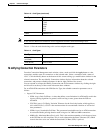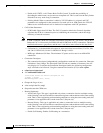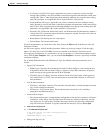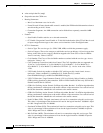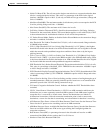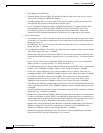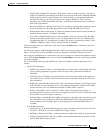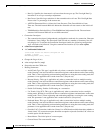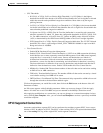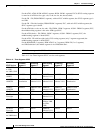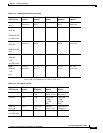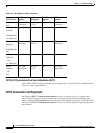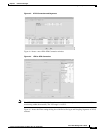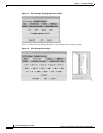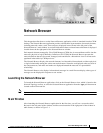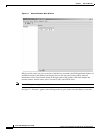
4-31
Cisco WAN Manager User’s Guide
Version 10.5, Part Number 78-12945-01 Rev. D0, August 2003
Chapter 4 Connection Manager
PVC Connections Supported by Release 10 of CWM
• UPC Thresholds
–
Hi CLP(% of VCQ): Cell Loss Priority High Threshold (% of VC QMax) is the highest
threshold for the bit in the header of an ATM cell that identifies the cell as eligible for discard
within the network under predefined congestion conditions. Most often set by the ingress
policing function.
–
Lo CLP(% of VCQ): Cell Loss Priority Low Threshold (% of VC QMax) is the lowest threshold
for the bit in the header of an ATM cell that identifies the cell as eligible for discard within the
network under predefined congestion conditions.
–
Vc Queue size (VCQ): A FIFO (First In First Out) buffer that is created for each connection
when the connection is added. VC_Queue has configurable thresholds for EFCI, CLP Hi, CLP
Lo. For ABR connections, cells move from VC_Queues to QBINs at the Allowed Cell Rate
(ACL) as determined by the ATM Forum ABR algorithm or the Cisco Foresight algorithm.
–
EFCI Queue Size(% of VCQ): Explicit Forward Congestion Indication. The VC EFCI discard
threshold. This value is a percentage of MAX_CELL THRESH. 1000000 is equal to m100%.
Range and values: 0-1000000.
• Flow Control Service
–
Enable BCM: Backward Congestion Management.
–
Enable VSVD: Virtual Source/ Virtual Destination. A VSVD is an ABR connection which may
be divided into two or more separately controlled ABR segments. Each ABR control segment,
except the first, is sourced by a virtual source. Sources and destinations are linked via
bi-directional connections, and each connection termination point is both a source and a
destination, a source for data that is transmitting, and a destination for data that is receiving.
The forward direction is defined as from source to destination, and the backward direction is
defined as from destination to source. Enable VSVD enables this Flow Control Service.
–
NRM(cells): Number RM. The maximum number of data cells that can be sent before sending
an RM cell on an ABR connection.
–
TBE(cells): Transient Buffer Exposure. The number of RM cells that can be sent out by a virtual
source before waiting for a BRM cell in return.
–
FRTT(millisec): Fixed Round-Trip Time. The amount of delay expected for an RM cell to travel
through the network to the destination and back again.
Click on the parameter you would like to edit, then click on the Edit button at the bottom of the All
Parameters window.
An Edit screen appears with all editable parameters. Make any necessary changes. Click the Apply
button. All values are saved. Click O.K. and you are returned to the Modify Connection screen.
After applying modifications to a connection, you can save changes to a connection template for later
use by clicking Save Template. Also, you can select Load Template to retrieve a previously modified
connection template.
XPVC Supported Connections
Autoroute one/two/three segment PVC can be transformed to two/three segment XPVC in two stages:
deletion of PVC & addition of SPVC. The SPVC of the resulting XPVC will replace/substitute/extend
one of the routing PVC leg of the original PVC multi-segment connection.
Note XPVC connections can only be added by a proxy; not GUI.



